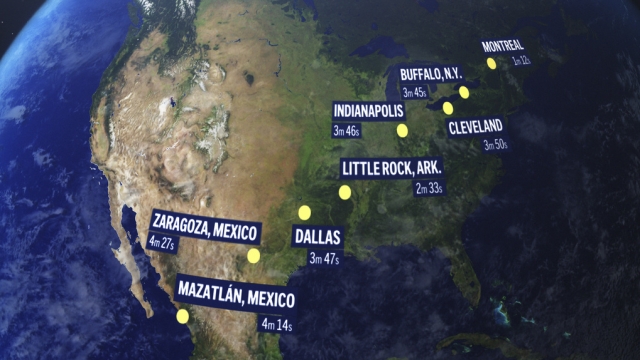If you're in Vermont, Maine and Canada, you're in luck. But for the rest of the path of Monday's total solar eclipse, it could be dicey weather-wise.
Clouds are forecast for much of the eclipse route through the U.S. with some possible patches of clear skies in some spots, according to the latest forecast from the National Weather Service.
Northern New England into Canada is still the best bet to witness the eclipse, when the moon blocks out the sun for a few minutes and day turns into night.
Texas is likely to have the heaviest cloud cover. More concerning, the weather service is forecasting severe weather — tornadoes and hail — about the time of the eclipse for parts of Texas, Oklahoma, Arkansas and Louisiana.
The forecast for the eclipse path has been fairly consistent for the past 10 days, said David Roth, a meteorologist with the weather service.
"Things aren't moving that fast," he said Sunday.
The path of total darkness stretches from Mexico and Texas through Maine and parts of Canada.
Keep an eye on the clouds
At the Great Lakes Science Center in Cleveland on Sunday, weather service meteorologist Alexa Maines tried to reassure visitors that all was not lost. A warm front was due to bring in clouds Monday morning, but they could clear out by eclipse time. "Cloud cover is one of the trickiest things to forecast," she said.
Eclipse weather expert Jay Anderson also thinks the eclipse could be visible from Dallas to Columbus through thin, high clouds. "Not the best conditions but tolerable," Anderson, a retired Canadian meteorologist, said via email.
"South of Dallas, there is a lot of low cloud that will disappoint a lot of eclipse enthusiasts," he said.
How can I see the solar eclipse if it's cloudy or rained out?
You can still watch the total solar eclipse online.
NASA will stream telescope views of the sun and on NASA TV starting at 1 p.m. EDT.
The Exploratorium museum, Time and Date and Slooh will also broadcast eclipse day views.
Trending stories at Scrippsnews.com



